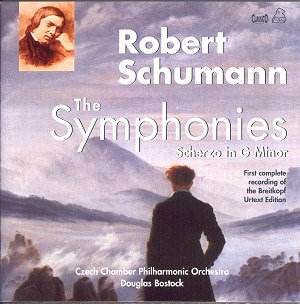Readers of classical record reviews often find
it bewildering that the same performance can elicit extremely
wide differences in opinion. I am even surprised when another
reviewerís conclusions are the opposite of mine. Upon reflection,
itís only natural that opinions might greatly diverge. Beyond
basic music structure including the element of contrast, music
is a highly emotional field. It has been with us since the beginning
of humankind because of its impact on our hearts and souls, not
our brains. The best a reviewer can do is point out general preferences
and/or prejudices in order to give readers a fighting chance to
break through the spectrum of personal opinion and make favorable
buying decisions.
Douglas Bostock, the conductor of this new set
of Schumannís Symphonies, has consistently received a mix of glowing
and disappointing reviews. At one end, he is considered a lumbering
and clumsy conductor who generally employs inadequate orchestras
and dispenses with any meaningful subtlety. At the other end,
he is praised as an electrifying force whose recordings fully
merit space alongside the best interpretations on record.
My review might add to a readerís confusion,
but I hope it will shed a little additional light on Douglas Bostock.
In releasing a set of Schumannís Symphonies, both ClassicO and
Bostock have entered a very highly recorded field. There are literally
hundreds of recorded performances with a staggering number of
them being exceptional.
First, Bostockís Schumann is hardly electrifying.
He does well at conveying the musicís drama and forward momentum,
but thereís nothing in these performances of a thrilling nature.
Also, the volume controls need to be set very high in order for
any sense of excitement to come through. In comparison, the Sawallisch
readings are exciting even at low volume, as he consistently maintains
strong tension.
A second concern is that the sound is on the
diffuse side. Weak definition causes a reduction in tension, and
thatís never a favorable condition in Schumannís Allegros. Thirdly,
versions of Schumannís symphonies such as Sawallischís impart
a strong dignity and stature that Bostockís often rounded attacks
do not allow. This is most noticeable in slow movements, the trios
of the Scherzos, and in the slow introductions to the symphonies
such as the fanfare of the 1st Symphony where Bostock
only offers a small percentage of the nobility flowing through
Sawallischís performances.
To Bostockís credit, I do not notice any lumbering
quality to his interpretations, and the orchestra fullfills its
responsibilities in admirable fashion. Bostock isnít the man to
take full opportunity of nuance and subtlety, but heís hardly
on automatic pilot.
Finally, ClassicO touts its set of the Schumann
Symphonies as being true to Schumannís wishes through use of the
Breitkopf Urtext Edition which is based on Joachim Draheimís critical
new edition that was published between 1993 and 2001. As the liner
notes state, "The recording represents a consistent musical
transposition of this new edition and refuses to make any compromises
with a tradition marred by an overly free and negligent treatment
of Schumannís original indications pertaining to the instrumentation
and tempo".
Such smug statements may sound convincing, but
I detect little difference between Bostockís and Sawallischís
approaches. For better or worse, the new edition does not change
the flavor of the music in the least. Bostock is a little leaner
in texture than Sawallisch, but the difference is not of major
proportions.
In conclusion, the new ClassicO set of Schumannís
Symphonies is rewarding but not among the most compelling accounts
on disc. A diffuse soundstage, lack of definition on Bostockís
part, and a significant deficiency of nobility hamper the performances
to the degree that I cannot recommend the set when better recordings
are available at no more than the mid-price range from Sawallish
on EMI, Kubelik on Deutsche Grammophon, and Szell on Sony.
Don Satz
